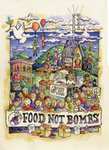Subscribe to:
Post Comments (Atom)
If you think you're too small to be effective, you've never been in the dark with a mosquito.
"The world is a dangerous place, not because of those who do evil, but because of those who look on and do nothing."-- Albert Einstein
Search for "The world is a dangerous place, not because of those who do ... Search for a map Translate
Source: Attribution goes here
Bing Highlights
Version 1.0.0 (12)
Copyright © 2010 Microsoft Corporation. All rights reserved.
SupportSource: Attribution goes here
Never doubt that a small group of thoughtful, committed citizens can change the world. Indeed, it is the only thing that ever has.
Margaret Meade
Margaret Meade
Contributors
RNC 8
Thinking Outside the Box

TOB Logo Created by Liz Diaz
Blog Archive
-
►
2010
(148)
- December (12)
- November (10)
- October (2)
- September (8)
- August (18)
- July (22)
- June (16)
- May (20)
- April (11)
- March (6)
- February (7)
- January (16)
-
►
2009
(336)
- December (19)
- November (16)
- October (10)
- September (21)
- August (11)
- July (21)
- June (9)
- May (18)
- April (39)
- March (38)
- February (28)
- January (106)
-
▼
2008
(344)
- December (20)
- November (6)
- October (18)
- September (35)
- August (17)
- July (17)
- June (27)
- May (10)
- April (14)
- March (57)
- February (45)
- January (78)
Media Matters

Lefty Blogs



Creative Commons

Unless otherwise noted, creative work on this website is licensed under a Creative Commons Attribution-NonCommercial-ShareAlike 2.5 License.
Feed
Occupy Wall Street






2 comments:
Mr. Vink the Fink should move to Miami and take his upper-class buddies with him. Then Chavez can give their fabulous homes to the poor.
John Pilger's 'The War on Democracy' won the 2008 Best Documentary at the One World Media Awards, beating out Taxi to the Dark Side and others. It is a good film, doing much to show the history of U.S. imperialism in Latin America, but has serious flaws. The film traces several of the more famous interventions in Latin America by the U.S., and portrays them, appropriately, as anti-democracy. The film interviews the poor, the witnesses and victims of abuses, as well as the rich and members of the power elites.
The highlight of the documentary was the interview with Duane Clarridge, a CIA operations officer and Iran-Contra terrorist / counter-terrorist. Clarridge spelled out clearly the CIA position of complete disregard for the rule of law in pursuance of what he sees as the national interest. The question I wished Pilger had asked in response was -- who gets to decide what are "our" interests, the CIA or the people and the democratic system?
The film focuses heavily on Venezuela, especially in telling the story of the 2002 coup attempt, which was done much better in The Revolution Will Not Be Televised. Pilger's version of the coup comes off much more propagandistic. Throughout the film, Pilger cuts to an interview with Hugo Chavez. I wished that Pilger had at least learned enough Spanish to be able to pronounce the name "Hugo," and I had problems with his using Hugo's as the framing story. Chavez is the most powerful leftist in the hemisphere. To treat his story as quintessential is to accept that power is what truly matters. Many movements in Latin America self-identify as against power and presidents and Pilger ignores them. Leaving out the words of Che and Subcomandante Marcos, Pilger presents the aspirations of the oppressed without the framework of ideas in which they arose. There was no reference to the Zapatistas in the film, and the coverage of the Aymara and other indigenous groups lacked any exploration of their traditions, ideas, perspectives, and alternatives. Failing to explore the history of Latin-American indigenous movements, anti-politician movements, anti-imperialism, and anti-vanguardism, Pilger has made a film about coups, presidents and power, which is only half of the story.
Post a Comment